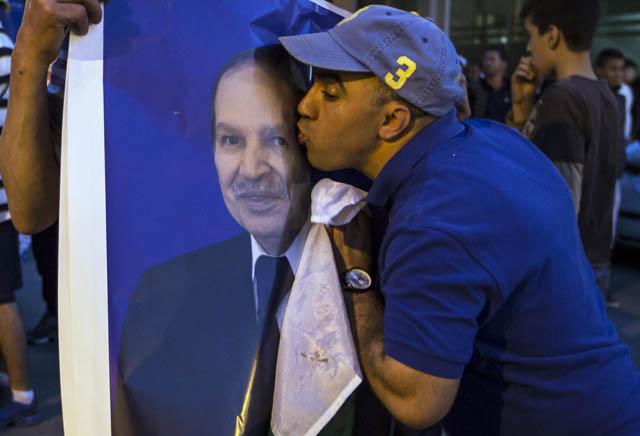You are here
Algeria’s ailing Bouteflika to seek reelection — presidency
By AFP - Feb 22,2014 - Last updated at Feb 22,2014
ALGIERS — Ailing Algerian President Abdelaziz Bouteflika, who turns 77 next month, will run for a fourth term in April, his office said Saturday in comments carried by national television.
Bouteflika, in power for 15 years, suffered a mini-stroke last year and was hospitalised in Paris for three months. It had been unclear whether his health would prevent him from seeking reelection.
The president has informed the interior ministry of his intention to run in the April 17 poll and has collected appropriate documents, the television quoted Bouteflika’s office as saying.
The electoral law requires candidates to gather at least 60,000 signatures from supporters across no fewer than 25 provinces by midnight on March 4, and the documents will be used to that end.
Prime Minister Abdelmalek Sellal said Bouteflika had made his decision in “response to the encouragement of citizens from all over the country”.
“President Bouteflika is in good health. He has the intellectual capacity and vision needed to guarantee this responsibility,” Sellal told a news conference on Saturday.
But he added that Bouteflika could rely on aides to run the presidential campaign, which officially opens March 23.
“The president is not obliged to do everything. Members of his support committees can take charge,” said Sellal, who was his campaign manager in 2004 and in 2009.
Ironically, Bouteflika has not made any public address since returning home from hospital, has only received a few foreign dignitaries and chaired just two Cabinet meetings.
More than 80 people have said they will run, with the most serious challenger among them appearing to be Ali Benflis, known as a defender of human rights and popular with intellectuals.
Benflis, 69, was prime minister during Bouteflika’s first term in office and ran against him in 2004.
Bouteflika, one of the few remaining veterans of the war of independence against France, came to power in 1999 with the support of the military.
He ran unopposed as the candidate of the ruling National Liberation Front (FLN) after all other candidates withdrew, citing fears of electoral fraud.
The latter years of his rule have been dogged by ill health and, more recently, by corruption scandals implicating members of his inner circle.
Bouteflika has also tried to check the power of Algeria’s military and intelligence leaders, who have played a key role in the North African country’s politics since independence in 1962.
Despite his efforts to roll back their prerogatives, the army and its secretive DRS intelligence agency retain a great deal of political power.
There has been a mounting war of words over the role of the military in public life, relayed by Algeria’s independent media, in which senior officers were portrayed as opposing a fourth term for Bouteflika.
This month, a retired senior general urged him to step down “with dignity” and not stand for reelection.
Hocine Benhadid also accused his inner circle of “treason” after Amar Saidani, the ruling party’s secretary general, publicly accused the military intelligence chief of interfering in politics to the detriment of the country’s security.
But Bouteflika himself hit out on Tuesday at what he said were moves to undermine his office and the army, suggesting both were falling prey to political infighting.
“The fictitious conflict... within the ranks of the People’s National Army is linked to a destabilisation plan developed by those troubled by Algeria’s regional weight and influence,” he said, without elaborating.
Bouteflika, who never married and has no children, has been credited by many Algerians with helping end the murderous civil war in the 1990s that killed at least 150,000 people.
The conflict was sparked by the military-backed government’s decision to cancel elections in 1991 which an Islamist party had been poised to win.
Related Articles
Algerian President Abdelaziz Bouteflika made a rare appearance Monday to drop off papers for his reelection, as concerns grow over the ailing 77-year-old’s bid for a fourth term.
Algerian President Abdelaziz Bouteflika’s campaign chief promised on Sunday that constitutional changes would create a “broad democracy” if the ailing incumbent wins re-election next month.
A day after Algeria’s ailing President Abdelaziz Bouteflika won a fourth term, many young people in the oil-rich nation wonder if the next generation will ever have a chance to rule.

















